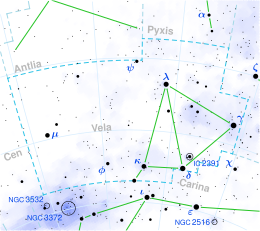Top Qs
Timeline
Chat
Perspective
HD 87816
Star in the constellation Vela From Wikipedia, the free encyclopedia
Remove ads
HD 87816 is a star in the constellation Vela. With an apparent magnitude of 6.499,[3] it is very close to the average threshold for naked eye visibility, and can only be viewed from sufficiently dark skies, far from light pollution.[8] Based on parallax measurements, it lies at a distance of 436 light-years.[2] It is moving away from the Solar System at a velocity of 4.7 km/s.[6]
The spectrum of this star matches a spectral class of K1III,[5] with the luminosity class III indicating it is a giant star that has exhausted the hydrogen at its core. It is now fusing helium, being in the evolutionary stage known as the horizontal branch.[4] The star has 2.4 times the Sun's mass, having grown to a radius 9.0 times the radius of the Sun. It shines with 45 times the Sun's luminosity at an effective temperature of 4,989 K.[3] The temperature gives it the orange hue typical of K-type stars.[9]
HD 87816 was once believed to be a variable star and received the variable-star designation R Velorum, but it is now considered a constant star.[1]
Remove ads
Planetary system
HD 87816 hosts two known exoplanets, discovered in 2025 via Doppler spectroscopy. Both are gas giants, like Jupiter and Saturn.[10]
Planet b has a minimum mass of 6.7 Jupiter masses (MJ). It takes 484 days (1.33 years) to complete an orbit around HD 87816 and has a very high orbital eccentricity of 0.78, among the highest of exoplanets orbiting giant stars.[10]
Planet c has a minimum mass of 12.2 Jupiter masses. It takes 7,600 days (21 years) to complete an orbit around its host, and has a low eccentricity of 0.11.[10]

Remove ads
References
Wikiwand - on
Seamless Wikipedia browsing. On steroids.
Remove ads

